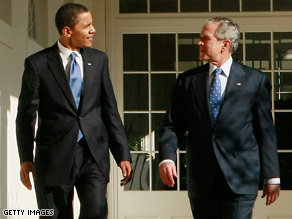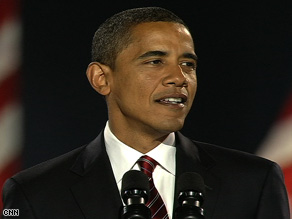A somber President-Elect Barack Obama announced his economic team, largely as expected, and laid the groundwork for a “substantial” economic stimulus package in January to “jolt this economy back into place.” He also took pains to reassure the financial markets that his administration doesn’t plan to reverse course on financial-rescue efforts in place, though he said “adjustments in the coming weeks and months” are still possible as events warrant.
Obama made clear that his economic team’s first priority is crafting an economic plan that will both revive the economy in the short term and create 2.5 million jobs over the next two years. And he made equally clear that the deficit is secondary, for the time being, despite projections by some that some the budget gap could reach $1 trillion next year.
“We’ve got to focus first on getting the economy back on track,” he said, acknowledging that “we’re going to see a substantial deficit next year, bigger than we’ve seen in some time,” though he declined to put a number on either the deficit or stimulus spending. “It’s going to be costly,” he said.
Nonetheless, perhaps to emphasize that reining in the deficit will be part of his longer-term planning, he said that on Tuesday, he would address plans to “reform how business is done in Washington, how the budgeting process works” with “meaningful cuts and sacrifices.”
Gains in the Dow Jones Industrial Average, which had risen some 320 points when Obama began speaking shortly after noon Eastern time, fell back to about 225 points over Friday's close after the last question before climbing again to a gain of about 264 points over the following hour.
Although Obama said some of the current administration's efforts to address the financial crisis "didn't work exactly as [intended]," he said they had helped stabilize the financial system. "My administration will honor the public commitments made by the current administration to address the crisis," he said in his prepared remarks.
As has been his habit since winning the Nov. 4 election, Obama said the government must move "swiftly and boldly" to prevent the economic slump from becoming significantly worse, saying "we cannot hesitate or delay." But he also reinforced the prevailing assumption that little in the way of economic stimulus is likely before he is sworn in on Jan. 20, urging "the new Congress" to "work on an aggressive economic recovery plan when they convene in early January." Congress left town last week having passed only an extension of unemployment benefits, with the possibility of returning to provide aid to automakers in December.
Obama also appeared to lay the groundwork for shifting his position on some tax changes, leaving open the possibility that his administration would not seek to quickly undo tax-cuts for upper-income Americans, but rather let them expire by 2011 as they would under current law.
He also supported assistance to the auto industry, but said it must be tied to meaningful reforms by automakers to ensure they remain viable once government aid ends. "We can't just write a blank check to the auto industry," he said. "Congress did the right thing, which is saying, you guys need to come up with the right plan and come back" with it before receiving any financial assistance.
The tone of his comments to reporters at the Hyatt Chicago were grave, warning that the country is "facing an economic crisis of historic proportions." But he tempered that with faith in "the spirit of determination and optimism that has always defined us."
"Again, this won't be easy," Obama said. "There are no shortcuts or quick fixes to this crisis ... and the economy is likely to get worse before it gets better." Then, wrapping up his prepared comments, he added: "I know we can work our way out of this crisis because we've done it before."
The economic team announced at the event was largely as reported over the weekend, with New York Federal Reserve President Timothy Geithner named as Obama's Treasury nominee and former Treasury chief Lawrence Summers named as director of the National Economic Council, making him perhaps Obama's top economic adviser. (BusinessWeek.com has more on Geithner and Summers.)
However, Obama tapped Christina D. Romer, a Berkeley economist and co-director of the committee that officially declares recessions, as director of the Council of Economic Advisers. Many had expected Austan Goolsbee, a University of Chicago behavioral economist and senior campaign economic adviser, to take the position. Romer's work includes research into the U.S. recovery from the Great Depression.
Obama also named Melody C. Barnes as director of the Domestic Policy Council, which coordinates domestic initiatives across the executive branch to match presidential priorities. Barnes, who works at the progressive Center for American Progress think-tank and served as a top domestic-policy adviser to Obama's campaign, will focus in part on health-care reform, working with the administration's Health and Human Services secretary. Former Senate Majority Leader Tom Daschle is expected to take that post.
Heather Higgenbottom, a former legislative director for Sen. John Kerry and founder of a national-security think-tank, will be Barnes' deputy.
'Business' 카테고리의 다른 글
| Research in Motion shares rise on BlackBerry sales (0) | 2008.11.25 |
|---|---|
| Porsche releases details on Panamera four-door car (0) | 2008.11.25 |
| How To Calculate Total Cost Of IT Ownership (0) | 2008.11.25 |
| Holiday Shopping Guide (0) | 2008.11.25 |
| Jet Set (0) | 2008.11.25 |




